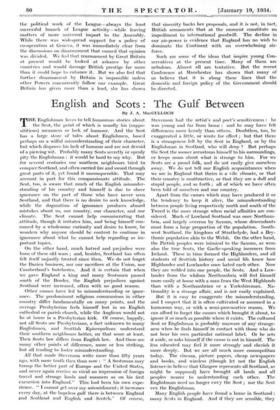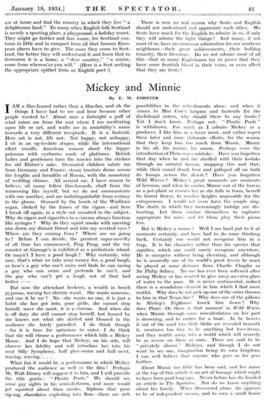English and Scots : The Gulf Between
By J. A. MacCULLOCH
THE Englishman loves to tell humorous stories about the Scot, the point of which is usually his (suppo- sititious) meanness or lack of humour. And the Scot has a large store of tales about Englishmen, based perhaps on a wilful misunderstanding of their character, but which disprove his lack of humour and are not devoid of a piercing wit. Probably many Scots secretly or openly pity the Englishman : it would be hard to say why. But for several centuries our southern neighbours tried to conquer Scotland, and often carried fire and sword through great parts of it, yet found it unconquerable. That may account in part for this compassionate attitude. The Scot, too, is aware that much of the English misunder- standing of his • country and himself is due to sheer ignorance on the part of those who have never seen Scotland, and that there is no desire to seek knowledge, while the dogmatism of ignorance produces absurd mistakes about us, our country, our character, and our climate. The Scot cannot help commiserating that attitude, though it irritates him, and being himself con- sumed by a wholesome curiosity and .desire to know, he wonders why anyone should be content to continue in ignorance about what he cannot help regarding as im- portant topics.
On the other hand, much hatred. and prejudice were born of these old wars ; and, besides, Scotland has often felt itself unjustly treated since then. We do not forget the Darien business, nor our sacrifices at the Union, nor Cumberland's butcheries. And it is certain that when we gave England a king and many Scotsmen passed south of the Border, the English prejudices against Scotland were increased, often with no good reason.
Other causes have led to misunderstanding or ignor- ance. The predominant religious communions in either country differ fundamentally on many points, and the average Presbyterian feels himself lost in an English cathedral or parish church, while the Anglican would not be at home in a Presbyterian kirk. Of course,' happily, not all Scots are Presbyterians, a fact unknown to many Englishmen, and Scottish Episcopalians understand their southern neighbours better, on that score at least. Then Scots law differs from English law. And there are many other points of difference, more or less striking, but all tending to foster misunderstanding.
All that made Stevenson write more than fifty years ago, with more truth then than now : " A Scotsman may tramp the better part of Europe and the United States, and never again receive so vivid an impression of foreign travel and strange lands and manners as on his first excursion into England." This had been his own expe- rience. " I cannot get over my astonishment; it increases every day, at the hopeless gulf there is between England and Scotland and English and Scotch." Of course, Stevenson had the artist's and poet's sensitiveness : he was young and far from home : and he may have felt differences more keenly than others. Doubtless, too, he exaggerated a little, or wrote for effect ; but that there is a strangeness felt by the Scot in England, or by the Englishman in Scotland, who will deny ? But perhaps the Scot the sooner accustoms himself to his surroundings, or keeps mum about what is strange to him. For we Scots are a proud folk, and do not easily give ourselves away. We do not tell our English acquaintances when we are in England that theirs is a vile climate, or that their country is unattractive, or that they are a dull and stupid people, and so forth ; all of which we have often been told of ourselves and our country.
Apart from the causes which may have produced it or the tendency to keep it alive, the misunderstanding between people living respectively north and south of the Tweed is the more strange when racial affinities are con- sidered. Much of Lowland Scotland was once Northum- bria, and largely overrun by Saxons, whose descendants must form a large proportion of the population. South- west Scotland, the kingdom of Strathclyde, had a Bry- thonic population akin to the Welsh. On the other hand, the Pictish peoples were inimical to the Saxons, as were also the true Scots, the Gaelic-speaking incomers from Ireland. These in time formed the Highlanders, and all students of Scottish history and social life know how Highlander and Lowlander once hated each other. Now they are welded into one people, the Scots. And a Low- lander from the whilom Northumbria will feel himself more easily at home with a man froM the West Highlands than with a Northumbrian or a Yorkshireman. Na- tionality is a strange affair, and is not easily explained.
But it is easy to exaggerate the misunderstanding, and I suspect that it is often cultivated or assumed in a humorous way, or with a semi-provocative reason: We can afford to forget the causes which brought it about, to ignore it as much as possible where it exists. The cultured Scot or Englishman is 'probably unaware 'of any strange- ness when he finds himself in contact with those who do not bear his own particular national label. Or he sets it aside, or asks himself if the cause is not in himself. The less educated may feel it more strongly and cherish it More deeply. But we are all much more cosmopolitan today. The cinema, picture papers, cheap newspapers and books, and wireless (though let not the English listener-in believe that Glasgow represents all -Scotland, as might be supposed) have brought all lands and all peoples -nearer to' understanding each other. The Englishman need no longer envy the Sea ; nor the Scot vex the Englishman.
Many English people have found A home. in Scotland ; many Scots in England. And if they are sensible,- they are at home and find the country in which they live " a delightsome land." -To many other English folk Scotland is merely a sporting place, a playground, a holiday resort. They might go farther and fare worse, for Scotland con- tains in little and in compact form all that famous Euro- pean places have to give. The more they come to Scot- land, the better they will understand it and learn that to Scotsmen it is a home, a " dear country," " a centre, come from whereso'er you will." (Here is a Scot seeking the appropriate epithet from an English poet !) There is now no real reason why Scots and English should not understand and appreciate each other. We Scots have much for the English to admire in us, if only they will admire the right things ! And many, if not most of us, have an enormous admiration for our southern neighbours—their great achievements, their bulldog tenacity, their literature. Do we not admire most of all this—that so many Englishmen try to prove that they have some Scottish blood in their veins, or even affect that they arc Scots !









































 Previous page
Previous page